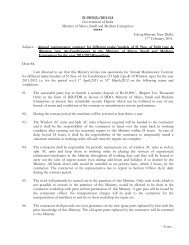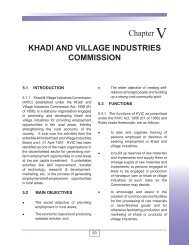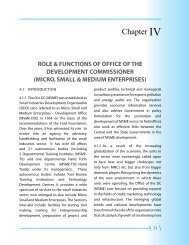Evaluation Study MSE Cluster Development - Ministry of Micro ...
Evaluation Study MSE Cluster Development - Ministry of Micro ...
Evaluation Study MSE Cluster Development - Ministry of Micro ...
You also want an ePaper? Increase the reach of your titles
YUMPU automatically turns print PDFs into web optimized ePapers that Google loves.
Chapter No: 6 – Hard Interventions in Sampled <strong>Cluster</strong>sthat need to be removed, the current status <strong>of</strong> hard interventions in the sampledclusters, and the impact <strong>of</strong> these hard interventions which are reflected in the functioning<strong>of</strong> the CFCs.6.2 The Justification for Hard InterventionsHard interventions are those measures implemented by legally constituted group ororganizations called SPVs that are involved in different common functional areascollectively serving a cluster or agglomeration <strong>of</strong> small and micro enterprises involved inthe processing and manufacture <strong>of</strong> largely similar goods or services.These Special Purpose Vehicles or “Hard Networks” are constituted for the followingreasons:• To enable individual cluster actors to access markets for goods and required inputs,<strong>of</strong>ten with the intention <strong>of</strong> eliminating intermediaries along the supply chain.• To enable the exploitation <strong>of</strong> the economies <strong>of</strong> scale in functional areas such aspurchase <strong>of</strong> essential and common inputs, procuring finance, production andmarketing.• To increase bargaining strength vis-à-vis input suppliers or customers or distributors.• To collectively bear the risks and costs involved in undertaking large projectsinvolving high investments and possible risks.• To avail the benefits <strong>of</strong> support schemes and special assistance by the state, financialinstitutions, and development agencies, which <strong>of</strong>ten requires the benefits to betransferred to legally constituted and accountable entities that function under specificregulatory statutes and rules.• To effectively demonstrate the power and concrete benefits <strong>of</strong> collective action andcooperation and also to provide a ‘safety net’ in a highly predatory and aggressivelycompetitive industrial system dominated by large national and multinationalenterprises.Hard interventions can be implemented on a Public-Private Partnership basis, and thebenefits derived from these initiatives in such a context may have greater justification asa long-term strategic measure rather than for short term commercial gain. It is alsoseen that some <strong>of</strong> these hard networks are created entirely on the basis <strong>of</strong> privateinitiatives, while others may be led by the State and State Agencies.It should be emphasized that with the advent <strong>of</strong> liberalization and “reforms”, theprotection and support provided to small and micro enterprises have undergone a greatdeal <strong>of</strong> change. The very definition <strong>of</strong> small enterprises has been considerably altered by‘de-reservation’ and increasing the limits <strong>of</strong> investments and turnover that were earlierused for defining a small enterprise. Many fear and have been <strong>of</strong>ten proved right aboutthe adverse effects <strong>of</strong> “opening up” the manufacturing sector in response to the call forfree multilateral trade. These adverse effects impact the developing countries moreseriously than they do, in the case <strong>of</strong> developed nations. The need for “safety nets” isnow universally justified perhaps fearing a major economic disaster that may have itsown political consequences. The <strong>Cluster</strong> <strong>Development</strong> Programme can also be visualizedas an effective industrial safety net in this era liberalization and ‘reforms’.105
















